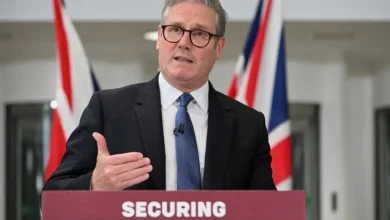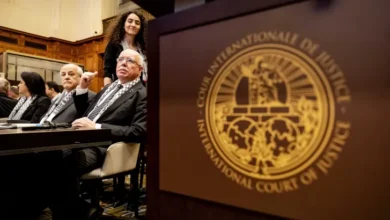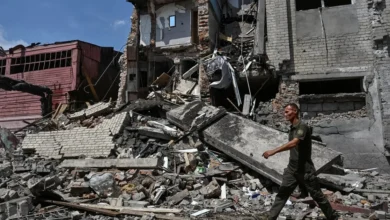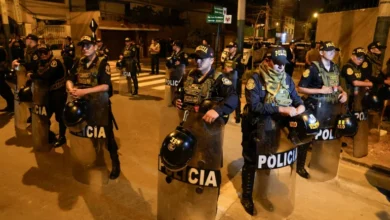Cambodia PM Hun Sen’s party claims ‘landslide’ in flawed election

Prime Minister Hun Sen’s Cambodian People’s Party (CPP) has claimed a “landslide” victory in national elections described by critics as the country’s least free and fair vote in decades.
“We’ve won a landslide victory but so far there is no clear figures yet [on seats won],” said Sok Eysan, spokesperson for the CPP, just hours after polls closed on Sunday.The claim of an election walkover by the governing party followed after Hun Sen said voter turnout hit 84 percent on Sunday.
Hun Sen said the strong voter participation proved that a campaign to undermine the election – by what he described as an “extremist” opposition – had failed, Reuters news agency reported. Some 9.7 million people registered to vote among Cambodia’s approximately 16 million population.Voters who had destroyed their ballot papers in protest against the election should turn themselves in to authorities or face “legal consequences”, Hun Sen said in a message on the Telegram messaging app, Reuters reported.
Opponents and human rights groups had blasted the election due to the lack of credible competition as well as Hun Sen’s strongman tactics that have now silenced all opposition to his rule in Cambodia.The National Election Committee (NEC) reported earlier on Sunday that two people were arrested under laws recently passed to prevent people from protesting against the one-sided election by spoiling their votes.
One of those detained had drawn an “X” over their ballot paper and posted an image on social media, and the second person had stuffed the ballot in their pocket to remove it from the voting station and discard it, NEC spokesperson Som Morida said.‘Predictable outcome’
Eighteen parties, including Hun Sen’s juggernaut CPP, participated in the election, though none of the 17 smaller parties had the popular support to present a serious challenge to Hun Sen’s decades of authoritarian leadership.
The only credible opposition challenger – the Candlelight Party – was disqualified from participating in the vote due to a registration technicality in May, which critics blasted as yet another example of Hun Sen’s flattening of democratic participation in the country.‘Predictable outcome’
Eighteen parties, including Hun Sen’s juggernaut CPP, participated in the election, though none of the 17 smaller parties had the popular support to present a serious challenge to Hun Sen’s decades of authoritarian leadership.
The only credible opposition challenger – the Candlelight Party – was disqualified from participating in the vote due to a registration technicality in May, which critics blasted as yet another example of Hun Sen’s flattening of democratic participation in the country.Voters interviewed by Al Jazeera on Sunday gave differing views of the election process with some welcoming the exclusion of the opposition from voting, and former supporters of the CNRP telling of the fear they now feel under an increasingly authoritarian Hun Sen.
“Whenever there’s opposition, it’s messy, causing problems,” voter Tea Yumao, 50, said.
A 37-year-old taxi driver told how he “loved” Cambodia’s now-banned opposition CNRP and its leaders but feared government repercussions if he did not vote on Sunday. He also believed authorities had ways of discovering how people voted.“I’m very worried about them saying they can see our vote afterwards,” he told Al Jazeera, requesting anonymity as he feared consequences for speaking with reporters, shortly after casting his ballot.
“We know the situation. We know the truth. But we can’t speak,” he added.
Hun Sen succession
A 44-year-old voter in Phnom Penh, who also asked that her name not be used, told Al Jazeera she was unhappy with the lack of competition in the election.
But she said she looked forward to Hun Sen stepping aside to allow his son, Hun Manet, to become prime minister.
“I only know that this year, it will be the son who takes over,” the woman said, adding that she hopes a new prime minister focuses on the economy and the poor.Thanking well-wishers and the team that treated him in hospital, Netanyahu in a video statement said: “As you can see, I am doing excellently.”
“We are pursuing efforts to complete the legislation, as well as efforts to do this through consensus, but in any event I want you to know that tomorrow morning I’ll be joining my colleagues in the Knesset,” he said, referring to Monday’s vote in the Israeli parliament.
In the video, Netanyahu said that he was outfitted with a monitor after last week’s hospitalisation and that when an alarm beeped late on Saturday, it meant he required a pacemaker right away.
“I feel great, but I need to listen to my doctors,” he said.Professor Roy Beinart, senior physician and director at the Davidai Arrhythmia Center at Sheba Medical Center’s Heart Institute, said doctors had decided to monitor Netanyahu because he had suffered from a “conduction disorder,” or irregular heart beat, for years.
He said in a video that the prime minister needed the pacemaker because he experienced “a temporary arrhythmia,” or irregular heartbeat, Saturday evening.
“The implantation went smoothly, without any complications. He is not in a life-threatening condition,” Beinart said. “He feels great and is returning to his daily routine.”
A pacemaker is used when a patient’s heart is beating too slowly. It can also be used to treat heart failure.
By sending electrical pulses to the heart, the device increases or maintains a person’s heartbeat at a normal rhythm, allowing the heart to pump blood to the body at a normal rate.










